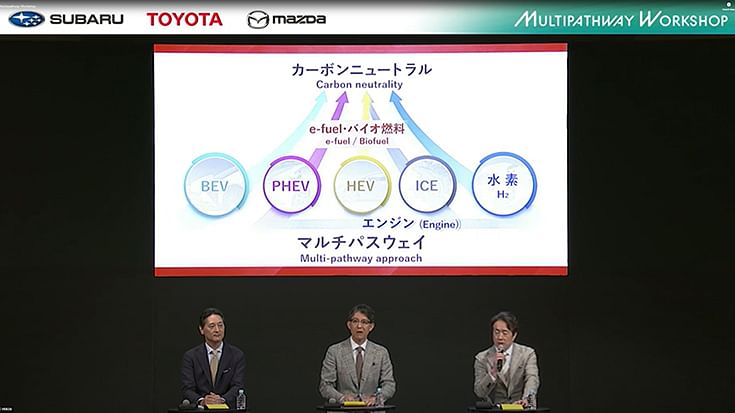Subaru, Toyota and Mazda to develop new engines in drive towards carbon-neutrality
While transforming vehicle packaging with more compact engines, the three Japanese automakers will also decarbonise IC engines by making them compatible with various carbon-neutral fuels as well as optimise their integration with electric drive units.
Subaru, Toyota and Mazda, which compete in the product arena with unique engines and cars, have a shared dedication to achieving carbon neutrality through a multi-pathway approach. Today, the three Japanese companies have each committed to developing new engines tailored to electrification and the pursuit of carbon neutrality. With these engines, each of the three companies will aim to optimise integration with motors, batteries, and other electric drive units.
While transforming vehicle packaging with more compact engines, these efforts will also decarbonize ICEs by making them compatible with various carbon-neutral (CN) fuels. CN fuels are fuels with net zero CO2 emissions into the atmosphere across their lifecycle, from manufacture to use. These include e-fuel, made from hydrogen and carbon dioxide, and biofuels derived from biomass.
Subaru, Toyota, and Mazda typically develop signature engines that not only represent their respective brands but also cater to their customers' unique needs and preferences. Subaru has its horizontally-opposed engine where the pistons move horizontally, resulting in a low-profile engine with less vibration and lower centre of gravity. While Toyota is renowned for its inline-four engine which achieves both high output and high thermal efficiency, Mazda’s rotary engine is a compact and lightweight, yet powerful unit.
 L-R: Subaru CEO Atsushi Osaki, Toyota CEO Koji Sato and Mazda CEO Masahiro Moro at the joint announcement on May 28.
L-R: Subaru CEO Atsushi Osaki, Toyota CEO Koji Sato and Mazda CEO Masahiro Moro at the joint announcement on May 28.
Under the extreme conditions of racing, the three Japanese automakers have worked to broaden powertrain and fuel options by competing with vehicles running on liquid hydrogen and CN fuels.
This process has clarified the role that future engines will play in achieving carbon neutrality. With the next generation of engines, the three companies will seek to not only improve standalone engine performance but also optimize their integration with electric drive units, harnessing the advantages of each.
While being highly efficient and powerful, the new engines will also revolutionise vehicle packaging by being more compact than existing models. Smaller engines will allow for even lower hoods, improving design possibilities and aerodynamic performance while contributing to better fuel efficiency. The development will also emphasize compliance with increasingly strict emissions regulations.
At the same time, the new engines will be made carbon neutral by shifting away from fossil fuels and offering compatibility with various alternatives, including e-fuel (synthetic fuel), biofuels, and liquid hydrogen. In doing so, these engines will contribute to the broader adoption of CN fuels.
Commenting on the partnership, Atsushi Osaki, Representative Director, President and CEO, Subaru Corporation, said: "Achieving a carbon-neutral society is a challenge that must be undertaken by all of Japan's industries and society as a whole. As we continue to refine electrification technology, we will also enhance our horizontally-opposed engines with an aim to use carbon-neutral fuels in the future. Moving forward, the three companies sharing the same aspiration will continue to advance the pursuit of sustainable excellence in Japanese car manufacturing."
Koji Sato, President, Member of the Board of Directors and CEO, Toyota Motor Corporation, commented: "In order to provide our customers with diverse options to achieve carbon neutrality, it is necessary to take on the challenge of evolving engines that are in tune with the energy environment of the future. The three companies, which share the same aspirations, will refine engine technologies through friendly competition."
Masahiro Moro, Representative Director, President and CEO, Mazda Motor Corporation, said: "We will continue to offer customers exciting cars by honing internal combustion engines for the electrification era and expanding the multi-pathway possibilities for achieving carbon neutrality. Given the rotary engine's compatibility with electrification and carbon-neutral fuels, Mazda will continue to develop the technology through co-creation and competition to ensure it can contribute broadly to society."
Today's announcement comes a day after Idemitsu Kosan, ENEOS, Toyota and MHI commenced a study on carbon-neutral fuels, aiming to discuss and explore scenarios and roadmaps for the introduction of carbon-neutral fuels in Japan's automobile market and the various systems necessary for market introduction.
Lead image: Toyota
RELATED ARTICLES
Autoliv Plans JV for Advanced Safety Electronics With China’s HSAE
The new joint venture, which is to be located strategically near Shanghai and close to several existing Autoliv sites in...
JLR to Restart Production Over a Month After September Hacking
Manufacturing operations at the Tata Group-owned British luxury car and SUV manufacturer were shut down following a cybe...
BYD UK Sales Jump 880% in September to 11,271 units
Sales record sets the UK apart as the largest international market for BYD outside of China for the first time. The Seal...






 By Autocar Professional Bureau
By Autocar Professional Bureau
 28 May 2024
28 May 2024
 3389 Views
3389 Views


















 Ajit Dalvi
Ajit Dalvi




